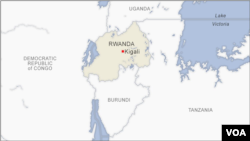Rwanda says it is sending 1,000 security personnel to Cabo Delgado province in northern Mozambique to help fight Islamist militants who have terrorized the region.
In a statement issued Friday on the government's website, Rwanda said the deployment would start immediately and was being done at the request of the Mozambican government.
Mozambican officials did not respond to VOA’s request for comment Friday.
"We are deploying 1,000 soldiers and policemen to help Mozambique in the fight against jihadists in Cabo Delgado,” Rwandan army spokesman Colonel Ronald Rwivanga told VOA’s Central African Service.
The Rwandan government said its troops would join forces with Mozambique’s and others from the South African Development Community to “support efforts to restore Mozambican state authority by conducting combat and security operations.”
SADC countries agreed last month to deploy forces to troubled Cabo Delgado but have yet to announce the size of the force or a timeline. Rwanda is not a member of the 16-country bloc.
Cabo Delgado has experienced several years of unrest that intensified in 2020, when Islamist extremists seized parts of the province, including the city of Mocimboa da Praia. On March 24 of this year, militants took control of the coastal town of Palma for several days, displacing more than 35,000 civilians. New attacks have been reported near Palma in recent weeks.
The insecurity led the French energy company Total to suspend its multi-billion-dollar liquified gas project in Cabo Delgado April. Cabo Delgado has Mozambique's largest natural gas reserves.
Rwanda said the troop deployment to Mozambique is based on the two countries’ good relations following several agreements in 2018.
Asked if Rwanda may increase its contingent in the future, Rwivanga said “as of now that is the number we agreed on, but, if they feel the need to increase it, they will let us know.”
Asked if Rwanda does not fear retaliation from jihadists, he said, "I think it would not be the first time we are fighting jihadists. You very well know that we faced that issue elsewhere, including in Central Africa Republic. We are used to dealing with such issues and it should not be a concern to us."
This report originated in VOA’s Central Africa service.




